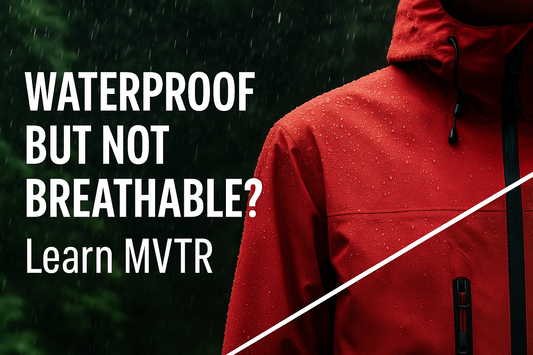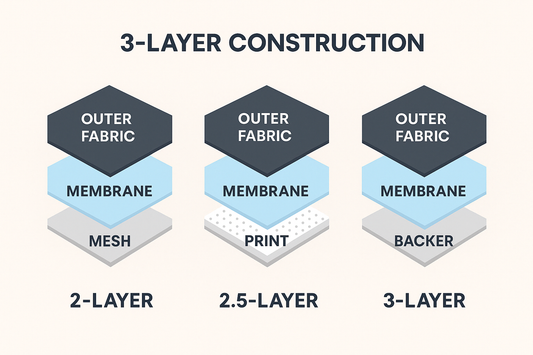
Sorona Fabric Explained: Properties, Comparison, and Alpargali Outerwear
Share
When it comes to menswear, especially for the colder months, the struggle is always the same: how do you stay warm without feeling weighed down? Traditional winter gear often forces a compromise — the heavy puffers keep you insulated but feel bulky in the city, while lighter jackets look sharp but don’t always hold up when temperatures drop.
At Alpargali, we’ve been looking for ways to break that cycle. Our answer is to merge three breakthrough materials: graphene, aerogel, and Sorona fabric. Graphene adds strength and conductivity, aerogel delivers unmatched insulation, and Sorona brings softness, durability, and sustainability. Together, they create outerwear that adapts effortlessly from downtown streets to mountain trails.
In this article, we’ll dive into what Sorona is, why it matters, and how it transforms pieces like our Aerogel Graphene Puffer Jacket, Graphene Vest, and Graphene Lightweight Jacket.
What is Sorona fabric?
Sorona is a new generation of polyester made from a mix of plant-based and petroleum-based ingredients.
About 37% of the fiber comes from renewable corn sugars, which are fermented into PDO (1,3-propanediol) and then combined with PTA (purified terephthalic acid) to form the Sorona polymer. It has a lighter footprint and a softer, more versatile feel than the synthetics we’re used to. For menswear, that means durability and stretch without giving up comfort.
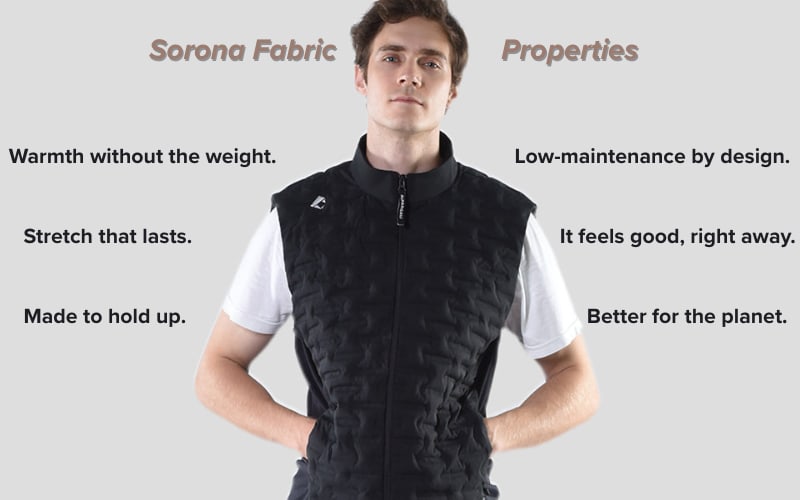
Sorona Fabric Properties
What really sets Sorona apart isn’t just that it’s partly plant-based — it’s how it feels and performs once it’s in your clothes. Here’s what stands out when you actually wear it:
It feels good, right away.
Some synthetics can feel a little stiff or plasticky, but Sorona has a softness that’s closer to cotton, with a smooth, almost silky touch. It’s the kind of fabric you don’t have to “break in” — it just feels comfortable from day one.
Stretch that lasts.
Most stretch fabrics rely on spandex, and if you’ve ever had a pair of pants lose their shape after a few washes, you know the downside. Sorona is different. The elasticity is built into the fiber itself, so it bounces back wash after wash, even after long days in the sun or exposure to chlorine.
Made to hold up.
Clothes aren’t cheap anymore, and the last thing anyone wants is a jacket that pills or looks tired after one season. Sorona is surprisingly tough — it resists abrasion and keeps fabrics looking newer for longer, even when you put them through heavy use.
Low-maintenance by design.
If ironing isn’t your idea of a good time, you’ll appreciate this: Sorona doesn’t wrinkle easily, and it’s naturally resistant to stains. That makes it ideal for city life, travel, or anyone who’d rather wear their clothes than fuss over them.
Better for the planet (without compromise).
Because part of Sorona is plant-based, its production uses less energy and generates fewer carbon emissions than standard synthetics. And at the end of its life, it can slot into normal polyester recycling streams. No miracle solution, but definitely a step in the right direction.
Warmth without the weight.
Perhaps the most surprising quality is how well it insulates. Sorona can keep you warm without making garments bulky or heavy, which is why you’ll often see it in outerwear and performance gear. It’s the kind of insulation that feels cozy, but still lets you move.
Sorona Clothing vs Traditional Clothing
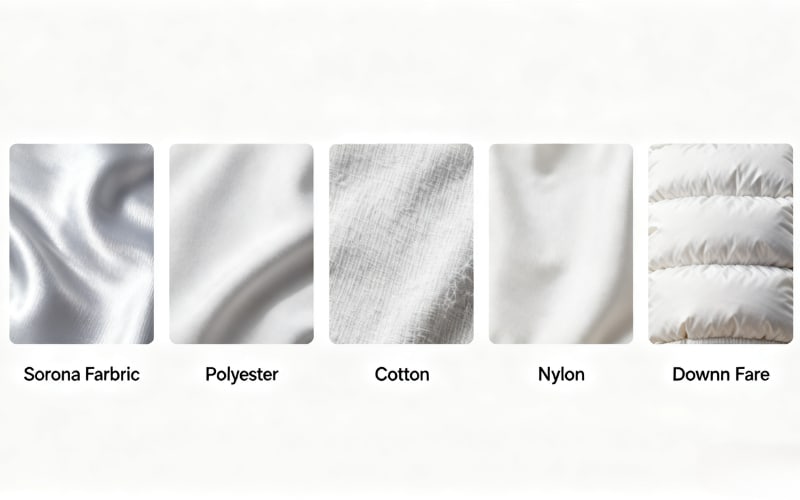
Sorona Fabric vs Polyester
Polyester has earned its place in menswear: it’s durable, affordable, and easy to dye. But anyone who’s worn a polyester jacket in a heated subway knows the downside—heat and moisture stay trapped inside, and the fabric can feel plasticky against the skin.
Sorona keeps the durability but changes the experience. The fiber’s natural elasticity gives garments a smoother drape, while its improved breathability means less of that “clammy” feeling. In practice, a Sorona jacket feels less like a shell you have to put up with and more like a layer you actually want to keep on.
Sorona vs Cotton
Cotton is a classic for good reason: soft, breathable, and naturally comfortable. The problem comes when weather turns. Cotton soaks through in rain, stays damp, and loses its shape after repeated wear.
Sorona doesn’t replace cotton’s everyday ease, but it solves cotton’s weak spots. It dries quickly, resists wrinkling, and maintains its structure after hours of wear. For menswear, this means trousers that don’t bag out at the knees and jackets that don’t sag after a wet commute—without giving up on comfort.
Sorona vs Nylon
Nylon is the benchmark for toughness. It’s the reason military surplus jackets and mountaineering shells last for decades. But toughness comes at a cost: nylon often feels rigid, less forgiving in motion, and not exactly refined for city wear.
Sorona bridges that gap. It brings nylon-level abrasion resistance with a softer, more flexible feel, so a jacket doesn’t scream “technical gear.” In menswear terms, you get outerwear that can handle a weekend hike yet still look and feel right at a dinner downtown.
Sorona Polyester vs Down
Down remains unmatched in pure warmth-to-weight. That’s why it’s beloved in luxury puffers and expedition parkas alike. Its flaw is equally clear: once wet, it collapses, losing both loft and insulation. And of course, it relies on animal sourcing.
Sorona insulation provides reliable warmth with fewer trade-offs. It holds heat even in damp conditions, dries faster, and avoids the bulk of overstuffed down. The result is a puffer that’s warm enough for winter streets, practical enough for travel, and aligned with cruelty-free values that more men are beginning to expect.
How Alpargali Puts Sorona to Work
Sorona isn’t just a concept on paper. At Alpargali, we’ve built it into pieces designed for very different situations — from city commutes to sub-zero expeditions. You can already see Sorona at work in some of our signature outerwear pieces.
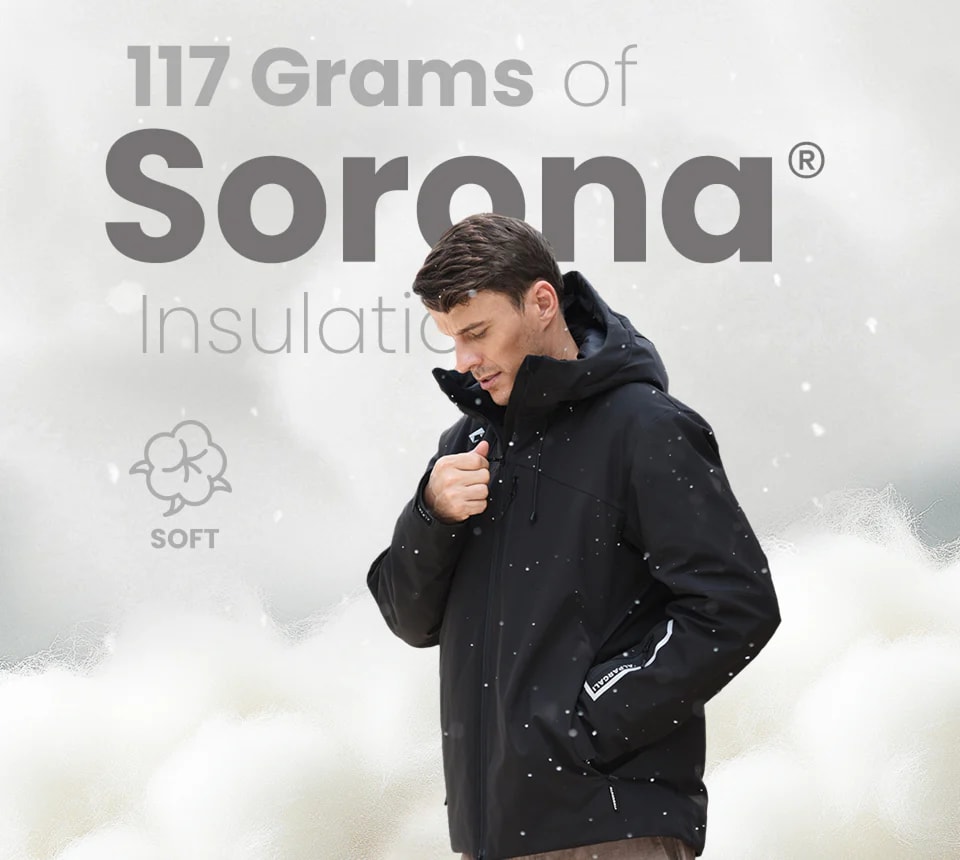
1. Graphene Lightweight Jacket
Think of this as your go-to hybrid for everyday life and weekend escapes. Sorona provides the lightweight insulation that keeps the jacket warm without weighing it down, while graphene adds its unique heat-regulating power and Teflon handles the elements.
The result? A jacket that feels just as natural on a cold subway platform as it does on a windy trail. If you only want one piece that balances function with city-ready style, this is it.
2. Graphene Vest
The vest strips things back even further, relying on Sorona as the core fill — a sustainable alternative to traditional down. It keeps the weight down, the warmth up, and the look sharp. Because it’s sleeveless, it breathes better and layers more easily, making it ideal for travel, outdoor sports, or just pulling off a clean urban look. For anyone who wants sustainability with a dose of versatility, this one nails it.
3. Alpargali Aerogel Graphene Puffer Jacket
Here’s where Sorona teams up with heavy hitters. Paired with NASA-inspired aerogel and the conductive power of graphene, it’s part of a four-layer insulation system that can handle temperatures down to –40°C.
Sorona’s role is to add warmth without bulk, so even in extreme cold you’re not stuck in a jacket that feels like armor. It’s technical, yes, but it’s also a statement: cutting-edge science and genuine sustainability can coexist in one seriously capable puffer.
Choosing the Right Piece
If you’re wondering which Alpargali outerwear fits your lifestyle best, here’s a simple way to look at it:
|
Product |
Best For |
Key Features |
|
City commutes and light outdoor adventures in spring, fall, and mild winter |
Lightweight, breathable, sleek design with solid weather resistance |
|
|
Layering, travel, and active use in spring, fall, or as a mid-layer in winter |
Slim profile, versatile, easy to pack, keeps you warm without bulk |
|
|
Extreme cold or full-on winter protection in harsh winter and sub-zero expeditions |
Four-layer insulation system, NASA-inspired aerogel, waterproof shell, built for –40°C conditions |
For anyone looking to bring Sorona into their own wardrobe, Alpargali’s outerwear range shows exactly what this fabric can do. Each piece is designed with a different balance of lightness, warmth, and protection, making it easy to find an option that feels right — whether that’s for daily city wear, travel, or braving deep winter.
Explore the Jackets and Vests at Alpargali and find the piece that suits your season, style, and pace of life. For a deeper look at the advanced fabrics we use — from Sorona to graphene and beyond — visit our Technology Fabrics page.
FAQs About Sorona
Is Sorona a good fabric?
Yes. Sorona combines the comfort of natural fibers with the durability and easy care of synthetics. It’s soft, long-lasting, and sustainable — which is why brands like Alpargali use it in technical outerwear that needs to perform across different climates.
Is Sorona stretchy?
It has natural elasticity built into the fiber itself. That means Sorona garments stretch and recover without needing spandex, so they won’t lose their shape as quickly. In our Graphene Lightweight Jacket, for example, this helps keep the fit comfortable even with active movement.
Is Sorona breathable?
Yes. Unlike heavy synthetics that trap heat, Sorona allows air to move through the fabric, making it a good choice for pieces you wear during city commutes, travel, or light outdoor activity.
Is Sorona wrinkle-resistant?
Unlike cotton, it doesn’t crease as easily, so garments stay sharp — even in packable styles such as the Graphene Vest.
Is Sorona polyester warm?
Sorona is a type of polyester (technically PTT), but it insulates better than standard polyester. It provides warmth without the bulk, which is why it’s included in the Aerogel Graphene Puffer Jacket for cold-weather protection.
Is Sorona fabric safe to wear?
Yes. Sorona is non-toxic, OEKO-TEX certified, and made without harmful chemical treatments. It’s safe even for sensitive skin.
Does Sorona pill or fade over time?
It resists pilling and holds color better than many traditional synthetics. With proper care, Sorona garments maintain their look longer, even with frequent use.
How should I wash Sorona garments?
Machine wash in cold water with a mild detergent, avoid bleach or fabric softeners, and tumble dry on low or hang to dry. That’s the care routine recommended for all our Sorona-insulated jackets and vests.
Does Sorona shrink?
No. Unlike cotton, Sorona doesn’t shrink in the wash, which helps garments keep their fit and size season after season.
Does Sorona hold odor?
Not easily. Sorona resists odor retention better than many synthetics, especially when combined with materials like graphene, which naturally fights odor — as seen in our Graphene Lightweight Jacket.
